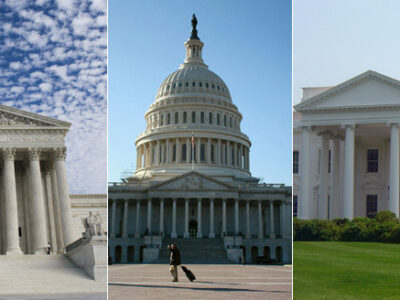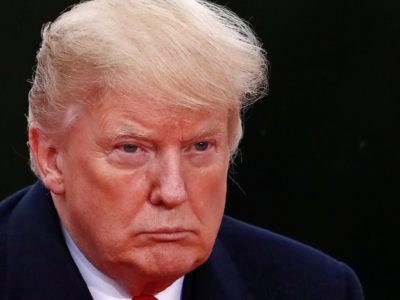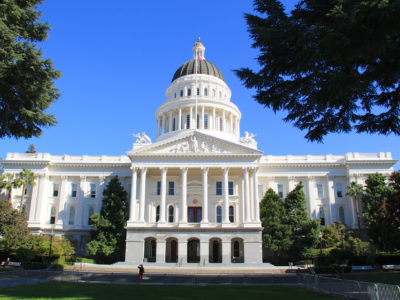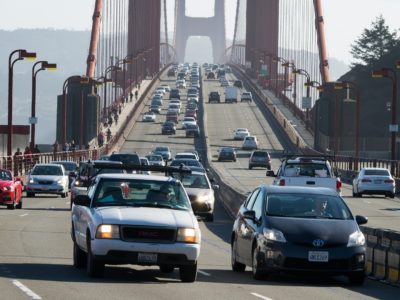Administrative Law
UCLA Law Professors Condemn Attacks on the Rule of Law
A letter to students with 106 signatories expresses collective condemnation of the Trump Administration’s attacks on the rule of law.
A huge group of UCLA Law professors sent a letter to our students yesterday expressing our collective condemnation of the Trump Administration’s attacks on the rule of law. In doing so we join colleagues from other institutions and law deans in voicing our concerns. Here is an important excerpt from the letter: Lawyers have special …
Continue reading “UCLA Law Professors Condemn Attacks on the Rule of Law”
CONTINUE READINGCorroding the Separation of Environmental Powers
“Who decides?” is the first question to ask about a policy issue. Trump’s answer is “me.”
Biden took actions that federal courts ruled exceeded statutory authority, raised separation of powers issues, or threatened federalism. The difference is that Trump has used brute-force attacks on agencies plus extortion against states rather than taking overt legal actions that courts can review.
CONTINUE READINGThe Downsides of Ping Pong Governance
Judicial review, by moderating policy swings, may be important to facilitating long-term investment
I’ve written about debates over permitting reform and other versions of regulatory streamlining to support the development of infrastructure that we need to address climate change. Another view, well articulated by Nicholas Bagley at University of Michigan, is that the problem is more fundamental: Excessive focus on governmental procedures and process, reinforced by searching judicial …
Continue reading “The Downsides of Ping Pong Governance”
CONTINUE READINGDissecting the Attacks on the Endangerment Finding
EPA has identified four different arguments against the endangerment finding. None have merit.
In late 2009, EPA made a formal finding — often called the Endangerment Finding —that greenhouse gases may endanger human health and welfare. Undaunted by the overwhelming scientific evidence in favor of that finding, the Trump EPA plans to reconsider that finding. Few independent observers believe EPA will succeed, but the issue is important enough to warrant a close look. Here’s a deep dive.
CONTINUE READINGEPA Jumps the Shark
Just as a past dictator rejected modern genetics, Trump rejects climate science. For both, evidence was no match for ideology and ego.
Honestly, EPA’s embrace of climate denial is just plain embarrassing. And the rest of the world will justifiably view it as one more sign that the U.S. has taken leave of its senses. Trump can change the name of a water body on maps, but he can’t change scientific reality. The scientific evidence about the reality of climate change, its causes, and its harms is incredibly well-established. It’s based on many different types of data and models, which have been tested and retested.
CONTINUE READINGThe Legal Complexities of Deregulating Power Plant Carbon Emissions
The Supreme Court struck down Obama’s powerplant regulation. but it didn’t endorse Trump’s first try either.
We are likely to end up with a Trump rule for powerplant emissions that is much weaker than the Biden rule, but not as weak as EPA’s effort in the first Trump Administration. And the process will take Trump longer this time, with a greater litigation risk.This matters because even a very weak rule may require significant investments in improving powerplant efficiency, which could result in some plant closures.
CONTINUE READINGTrump Shoves Economic Analysis and Science to the Curb
The MAGA agenda takes precedence over data and analysis.
If you were looking for data-driven regulatory policy, you’re not going to find it in this Administration. On the contrary, Trump has marginalized economic analysis and wants to bulldoze environmental science. Thus, we are likely to get policies that are bad for the environment without being cost-justified, while ignoring policies who environmental benefits outweigh economic costs.
CONTINUE READINGCongress Lacks Authority to Review California’s Car Waiver
It’s a complicated issue but the answer is clear: the Congressional Review Act does not apply.
States get many kinds of waivers from the federal government. For example, many states (including quite a few Red states) have received waivers from some Medicaid requirements. Overturning the EPA vehicle waiver would expose all state waivers to the risk of being overturned under the Congressional Review Act, contrary to the plain language of that statute.
CONTINUE READINGTrump’s Seven Most Anti-Environmental Moves — and How to Push Back
There were dozens of actions, all harmful to the environment. These are the worst of the worst.
In the month since he reentered the White House, Trump has dedicated himself to knee-capping environmental protection through a series of executive orders. These orders aim to eliminate crucial environmental regulations, eviscerate key agencies like EPA, arbitrarily halt government funding, and eliminate environmental restraints on the private sector. But these are not done deals, and there are ways of pushing back.
CONTINUE READINGThe California Car Waiver and the Congressional Review Act
Trump has found a possible way to end run California’s legal arguments for the waiver. But there’s no reason to give up.
If the CRA resolution does go through, California should wait until after the midterms, when Democrats are favored to take the House, and then try again with different formulated regulations. When the Trump Administration rejects them, it could then litigate whether the new versions were “substantially the same” as the old ones.
CONTINUE READING










